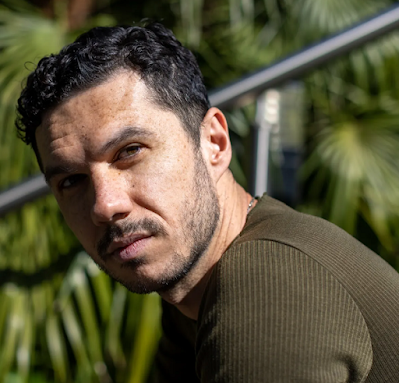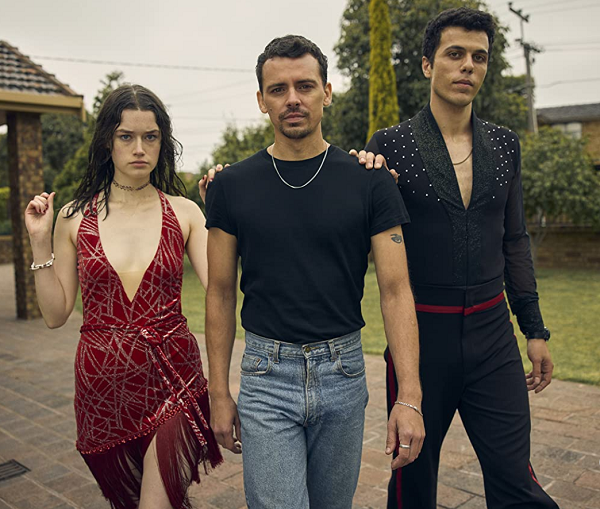Out director Goran Stolevski might not be a household name yet, but just give him a little more time. The 37-year old filmmaker made a big splash internationally last year with his first feature, You Won’t Be Alone. He’s set to make an even bigger splash this year, especially among gay audiences, with his new movie Of An Age. It is scheduled for release throughout the US by Focus Features on Friday, February 17th.
The film opens during the summer of 1999. In blue-collar North Melbourne, Australia, 18-year-old Serbian immigrant Kol (played by Elias Anton) is out of school forever. He’s preparing for the Australian Dance finals when he receives a distress call from his dance partner, Ebony, who has woken up on an unfamiliar beach after a big night out. With the help of Ebony’s older brother, Adam (Thom Green), they attempt to make it to the finals on time.
When Kol and Adam get stuck in traffic, however, they begin to realize they have more in common than they first thought. Over the course of the next 24 hours, an unexpected and intense romance blossoms between them. They are separated all too quickly when Adam moves to South America, but meet again a decade later for Ebony’s wedding and a bittersweet reunion.
Of An Age is an authentic, achingly romantic, sexy and moving film. Sensitively directed by Stolevski and beautifully acted by Green and Anton, it will touch any gay men who came of age between the 1990’s and the late 2000’s. Heck, I could identify with it even though I came out in the 1980’s.
Stolevski was born and grew up in North Macedonia before migrating to Australia at the age of 12. He completed a Bachelor of Creative Arts degree at the University of Melbourne and a Masters in Film and Television at the Victorian College of the Arts. He won the Ruben Mamoulian Best Director Award at the 2016 Sydney Film Festival before attending the Berlinale Talent Campus and MIFF Accelerator as well as receiving the $50,000 Lexus Fellowship for his short film, My Boy Oleg. His 25 shorts have variously screened at more than 100 festivals across six continents. He also directed three episodes of the International Emmy-winning series Nowhere Boys before making his feature film debut in 2022.
Though hard at work editing his next LGBTQ-themed movie, Stolevski recently took time to speak with this writer via Zoom during a cold winter night here and a sunny summer morning in Australia (given the 16-hour time difference).
CC: In the press notes, you say this isn’t really an autobiographical story, yet it feels so authentic. Why do you think that is?
GS: It’s not autobiographical in the sense that the events depicted didn’t really happen to me and I’m not either of the characters. I don’t dance, I’m not a dancer, I’ve never been to Argentina, but it is a little bit of an emotional diary of what 1999 felt like to me, in the place I found myself in at the time. In my high school years, I was very much kind of absent from my life. I was a massive film nerd at the time and I was sort of really living my life or looking for a life through movies, both what was coming out in cinemas as well as Katharine Hepburn movies. That’s what I thought is real life. Day-to-day school and other things happening around me were just things that were kind of gray and a blur. I was thinking back to that time in my life and how it was just a blank of six years, which were my teenage years and high school. And then trying to kind of excavate the feelings of that time, and I kind of felt like for life to have meaning or value it had to be something that was like cinematic, or literary, or artistic. I felt like the life I was living in suburbia was the opposite of cinematic, so I just wanted to write something that honored the kind of people I was around and the kind of place I was in and make it feel cinematic and meaningful.
CC: Would you say you are more like Kol or more like Adam, or both equally?
GS: I don’t really know, to be honest. I mean, Kol is me at 14 probably, not really 17. I was militantly and openly gay in my final year of high school, so I’m not that boy. And I’ve been happily married for almost 20 years. Well, not married legally for 20 years but in a relationship and then we got married. I think there is a little bit of me in both of them. I’m also Adam, mentally anyway. I’m also very much Ebony, to be honest (laughs), so you know it all comes from here ultimately (points to his head). I feel like yes, it comes from my brain and I wrote it but after all that it has its own life, especially once the film was cast. The kids — I call them the kids but they’re all adults — I’m very connected to them now. In bringing in the energies of Elias, Thom and Hattie Hook (who plays Ebony), the film wasn't really about my life at that point. But there were surreal moments like turning up to a unit and seeing a sea of vans and catering trucks outside the house that I grew up in, because that's where we needed to park that day.
CC: Your husband was reportedly very moved by your initial script. What does he think of the finished film? I’m assuming he’s seen it by now.
GS: Yeah. You know, it was 1:00 AM (when he was first inspired to write the story) but I jumped out of bed and started typing frantically. The first 75 minutes of the film, including most of the dialogues, were written in that one early morning sitting. The writer-director’s usual process is to let an idea gestate and not write until it's cohered into a world and a story in his head, so the experience was new and exhilarating. The story flooded out of me. The next day I started writing it out as a screenplay. I wrote all the 1999 time period scenes in a week, in a stream, and then realized the script was only 75 pages and no one’s going to make this film. (Laugh) The next day I thought: ‘Fuck it, I’m just going to write another 25 minutes in 2010,’ and I did that next day. That was the screenplay I sent to my husband, and he became very emotional. I thought at that point that maybe it’s good. Normally, he’s very blunt with me, and he didn’t say anything bad. He’s seen the movie a hundred times now and loves it, even though he’s an asshole. (Said sarcastically with a laugh.)
CC: You mentioned earlier that you watched a lot of movies starring the great Katharine Hepburn while you were growing up. Can you say a little more about that?
GS: I make this joke all the time: my friends growing up were Katharine Hepburn and Ingmar Bergman. I didn't have any friends in real life, and I was in this limbo state waiting for life to begin. When I completed the script (for Of An Age), I realized that no, life was going on then and there. I felt like I had not missed out on it, but I wasn't present in it. So this film would be about being present in that moment so that I feel like I lived it to its fullest. I do believe art is what makes life important, so I think that's the motivation to capture some of it so it doesn't go away.
CC: What do you hope young gay or queer men today will take away from Of An Age?
GS: That their feelings are universal. That we all have stories worth telling; all our lives can be cinematic. That we are all connected across generations. The experience of filming it was mind blowing, soul expanding, so that was enough in itself. I hope they can feel that. I think (the movie) really captures what I set out to capture: what a deep connection feels like and can feel like, and how rare that is and to appreciate it.
Reviews by Rev. Chris Carpenter, resident film and stage critic of Movie Dearest and Rage Monthly Magazine.













